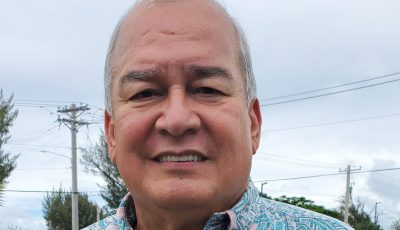Shifting sands of self-government
Since 1978 we walked the path of self-government. It’s a new beginning, confident we could march toward economic prosperity. With guaranteed seven-year funding from the feds the wind was on our back as we set sail on our journey.
In 1993 we announced before Congress that we no longer needed grant funds for government operations. We had sufficient locally generated revenues for our needs. It was one bright and proud moment in our developmental history! And the only one too!
Twenty-two years later the NMI government went bankrupt. Would Washington subsidize government operations here that include millions upon millions of dollars for the settlement fund, utilities, and other obligations? Or would it say, “It’s your canoe, see if you could navigate it.”
Dusk dims as our journey darkens. Would we see our way into dawn? Or have we hardened the view that we’ve simply cornered the market of ineptitude, performance morphing from wary to scary!
The economic nosedive was triggered by the shutter of the $2.1-billion apparel industry, dovetailed by the exodus of major Japanese investments for a loss of about $5 billion to $7 billion of money that was once recycled locally. We did one thing: turned ourselves into victims of internal blurred visions doing what we do best: Nothing! The least weak-kneed leadership could have done was crow. It didn’t though; some slept with the enemy!
Indeed, other investments came in but insufficient to make up for the loss and level of revenue generation the NMI once enjoyed. It goes to show the fragility of island economies when investment is ignored and flushed out the main gate.
Fortunately, there are social safety nets (federally funded programs) that have cushioned the wage and salary stagnancy here for over a decade. Without it, many families would sink deeper into the abyss of abject poverty. With it, it robs our people of their dignity to bring home the bacon. There’s the embrace of the combined adoption and adaptation of illusory short gain juggling which crutch is best. It’s a Band-Aid approach from A-Z.
We ventured into casino industry just as the PRC ordered Macau to begin working on economic diversification. Is there a lesson in that decision we could review for our purposes and survival beyond persistent fiscal crisis? Casino is likely to become a strong component of the visitor industry but never the mainstay. Its expansion could well meet the lack of hotel rooms here but what good is it when the market contracts, as is currently the case?
The journey has neither been steady nor sturdy. The situation needs real leadership, not consistent disorientation in spectatorship. The challenge requires the power and pride of leadership, a combined ambitious business and political visionaries, technology and science, a definitive parting with yesterday’s toxic paradigms that have failed us all these years. Must focus on “wealth and jobs creation,” nothing else!
Fostering partnership
Since the beginning of government jobs after the war, we look at the wellbeing of private industries as though a leper to avoid. There’s greater confidence in government jobs than personal industry or rugged individualism. We used to prosper doing the former.
This attitude was slowly cemented. In and out we careen where the public sector is and remains dangerously the largest employer here. Recalled how the Navy established small shacks selling various items. It was a demonstration that it is itself a form of income generation for families. But we dismissed it as the “other” person’s job or those who never successfully matriculated into government posts. But this vacuous antic must change!
Unless both sectors could converge or meet and trump its collective cards, nothing much would happen in moving the needle of growth forward. It remains an attitude of unsolicited alienation of private industries versus the local government. It has to evolve into a lifetime partnership. This partnership happens fluidly in the most successful economies worldwide.
The two sides must work on a complementary basis. If private industries sink, there’s less money for direly needed funds for public services. With this it must be understood that government is never in the business of turning in a profit. Thus it is imperative that both sides meet on a timely basis to review policy issues. It would also require a genuine set of plans so that everybody’s on the same page. Without it then it’s all ad hoc basis. In other words we fail to Plan For but Plan By what happens today. Not a very thoughtful mindset, planning the future of the NMI. Definitely, someone would have to break the invisible ice so meaningful discussion may begin in the near-term. We can’t continue doing what we do best: Nothing!



























